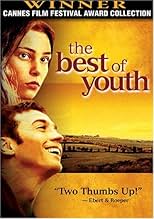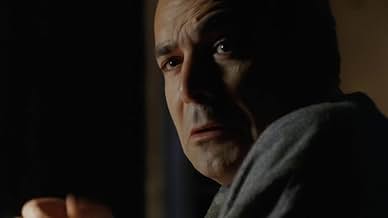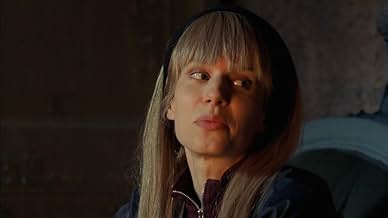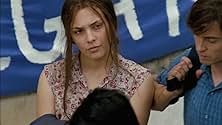अपनी भाषा में प्लॉट जोड़ेंAn Italian epic that follows the lives of two brothers from the 1960s to the 2000s.An Italian epic that follows the lives of two brothers from the 1960s to the 2000s.An Italian epic that follows the lives of two brothers from the 1960s to the 2000s.
- निर्देशक
- लेखक
- स्टार
- पुरस्कार
- 33 जीत और कुल 25 नामांकन
फ़ीचर्ड समीक्षाएं
10Peegee-3
Can art transform life? If so, I would elect "The Best of Youth" as a primary candidate for that possibility.
Almost never in my over 60 years of film viewing have I been as deeply affected, haunted by characterizations, poetic dialog and brilliantly unexpected turns...and breadth of scope. The nuances of relationship between people...in this case the Italian family Carati, their lovers, friends, wards...are so moving, so deeply portrayed and inhabited by the actors that I was not only moved to tears, but inspired. Here is a view of how human beings can live the humanity so desperately needed in this crazed and warring world...also presented as an integral part of plot and interaction...and this done without any sort of didactic or polemic foisting...All achieved through the intimate and profound struggles of the film's characters.
Imagination and the incredible sensibility of director (Marco Tullio Giordana),writers (Petraglia and Rulli) and actors (most outstanding: Luigi LoCacio, Alessio Boni, Adriana Asti and Jasmine Trinca) combine to offer a film that carried this participant (for that's what I felt) into a realm only experienced by exceptional literature.
As is obvious...I highly recommend seeing this movie.
Almost never in my over 60 years of film viewing have I been as deeply affected, haunted by characterizations, poetic dialog and brilliantly unexpected turns...and breadth of scope. The nuances of relationship between people...in this case the Italian family Carati, their lovers, friends, wards...are so moving, so deeply portrayed and inhabited by the actors that I was not only moved to tears, but inspired. Here is a view of how human beings can live the humanity so desperately needed in this crazed and warring world...also presented as an integral part of plot and interaction...and this done without any sort of didactic or polemic foisting...All achieved through the intimate and profound struggles of the film's characters.
Imagination and the incredible sensibility of director (Marco Tullio Giordana),writers (Petraglia and Rulli) and actors (most outstanding: Luigi LoCacio, Alessio Boni, Adriana Asti and Jasmine Trinca) combine to offer a film that carried this participant (for that's what I felt) into a realm only experienced by exceptional literature.
As is obvious...I highly recommend seeing this movie.
It's hard not to feel like an "easy" grader to give this film a 10, given that it is the very simple story of a family over 4 decades, no quirky writing or the eccentricities of "indie" films - just beautiful scenery, characters that move us and that we care about, and a sweet and believable story. The acting is excellent.
To say this is a miniseries is misleading and adds the impression of a "cheese" factor that is not present. There is a reason that this film has been taken from the small screen and released in theaters - I didn't even know it had been a miniseries until I read some of the comments here.
The story is simple but it is not trite; we may not have a huge number of surprises and no amazing plot twists and contortions but it is an emotional, moving, satisfying story.
The most moving part of the story is the love and connectedness between the characters, and how this is expressed - here in the U.S. physical display of platonic affection is virtually non-existent, unless you count athletes hitting each other on the rear. You can tell these characters really care for each other.
I sat for the second three hours today with people who sat through the first three hours with me yesterday. Some yesterday just got back in line for part 2. There was a line waiting to get in today - all people who had seen part 1 already.
Saying this movie is like Zelig as someone here did is false and insulting. We couldn't tell a story about a U.S. family that spans the 60's to the present without mentioning Viet Nam or Watergate or 9/11, so this story of course mentions events internal to Italy during that time. The historical events are a backdrop to the story, not the story itself.
The story is about this family, and we care about what happens to them. We become engaged, we sit and watch and laugh and cry with them. That's what movies are supposed to do.
To say this is a miniseries is misleading and adds the impression of a "cheese" factor that is not present. There is a reason that this film has been taken from the small screen and released in theaters - I didn't even know it had been a miniseries until I read some of the comments here.
The story is simple but it is not trite; we may not have a huge number of surprises and no amazing plot twists and contortions but it is an emotional, moving, satisfying story.
The most moving part of the story is the love and connectedness between the characters, and how this is expressed - here in the U.S. physical display of platonic affection is virtually non-existent, unless you count athletes hitting each other on the rear. You can tell these characters really care for each other.
I sat for the second three hours today with people who sat through the first three hours with me yesterday. Some yesterday just got back in line for part 2. There was a line waiting to get in today - all people who had seen part 1 already.
Saying this movie is like Zelig as someone here did is false and insulting. We couldn't tell a story about a U.S. family that spans the 60's to the present without mentioning Viet Nam or Watergate or 9/11, so this story of course mentions events internal to Italy during that time. The historical events are a backdrop to the story, not the story itself.
The story is about this family, and we care about what happens to them. We become engaged, we sit and watch and laugh and cry with them. That's what movies are supposed to do.
The Best of Youth is a wonderfully scripted, acted, and visually stunning film that will sweep you off your feet and into the lives of an Italian family as they go through the trials and tribulations of life. The film's main focus is on two brothers, Nicola and Matteo Catiti whose personalities are as different as night and day yet is also immediately apparent that these two love each other very much. Nicola is the younger, free spirited and philosophical brother while Matteo is more outspoken, with a hot temper and closed personality.
What I admired most throughout this film was the use and passage of time. Events in Italian history are not crammed into 120 minutes but is instead elongated, as Matteo and Nicola react in their own ways to the events that occur in their country. Time is such an important factor in this film, evidents not only by the six hour running time, but how those six hours are treated. Special occasions occur, yet none are given any special attention. The events that occur are important for that moment in time, yet one pass become mere memories such is the case of life.
With the passage of time, The Best Of Youth became such a moving experience for me. I felt as if I were a part of their family. I could not touch them, or talk to them, yet they seemed to welcome me with open arms as I silently watched their lives unfold before me. I could feel the love this family had for each other as I laughed and cried right beside them. Words just do not seem to be enough to describe the brilliance of this film. It is literally life transferred on screen.
The Best of Youth is remarkably acted and directed. At no time during this film was I bored, because such attention is made to character development, script, and cinematography. In the first part of the film, Nicola is exploring Norway, and sends a postcard to his brother back home telling him of his travels and experiences, and in three words, seems to sum up the film perfectly: "Life is beautiful." After viewing this film, you will share the same perspective.
HIGHLY Recommended
What I admired most throughout this film was the use and passage of time. Events in Italian history are not crammed into 120 minutes but is instead elongated, as Matteo and Nicola react in their own ways to the events that occur in their country. Time is such an important factor in this film, evidents not only by the six hour running time, but how those six hours are treated. Special occasions occur, yet none are given any special attention. The events that occur are important for that moment in time, yet one pass become mere memories such is the case of life.
With the passage of time, The Best Of Youth became such a moving experience for me. I felt as if I were a part of their family. I could not touch them, or talk to them, yet they seemed to welcome me with open arms as I silently watched their lives unfold before me. I could feel the love this family had for each other as I laughed and cried right beside them. Words just do not seem to be enough to describe the brilliance of this film. It is literally life transferred on screen.
The Best of Youth is remarkably acted and directed. At no time during this film was I bored, because such attention is made to character development, script, and cinematography. In the first part of the film, Nicola is exploring Norway, and sends a postcard to his brother back home telling him of his travels and experiences, and in three words, seems to sum up the film perfectly: "Life is beautiful." After viewing this film, you will share the same perspective.
HIGHLY Recommended
"Best of Youth (La Meglio gioventù)" proves that Italians have learned the art of the long-form television mini-series that the British have long mastered.
Covering a somewhat same period of the baby boom generation as "In A Land of Plenty," it has more of the generational feel of individuals caught up in history as we have usually seen in British mini-series about end-of-the-eras or World War I, such as "Brideshead Revisited" and "Jewel in the Crown." U.S. mini-series were more successful as sweeping historical epics, even when they were also family sagas like "Roots" and "Centennial;" when the networks tried to interpret more recent history, as in "The Sixties," the set characters sped through "Zelig" and "Forest Gump"-like in happening to be at the right place at the right time; perhaps the several seasons combined of the NBC series "American Dreams" could be considered comparable in showing how the times that are a-changing affect a family.
"Best of Youth" is being released in the U.S. in movie theaters, though I'm not sure even shown in two parts of three hours each how edited it is from the original format, as other grand European mini-series like "Berlin Alexanderplatz," "Das Boot" and "Fanny and Alexander" were originally only shown in the U.S. in truncated theatrical versions as even PBS seems averse to television with subtitles so we rarely get to see the best of world television. Comparison to the Italian film "The Leopard" is unfair as that was not created in the same format and covers a shorter period of historical time.
"Best of Youth" combines charismatic acting, leisurely directing amidst beautiful scenery in several parts of Italy with writing that takes the trajectories of complex yet consistent characters' lives believably and searingly affected by uniquely Italian experiences of the baby boomers' young adult years through middle age, without the American tendency to reject or regret youthful ambitions, through the lens of local natural disasters, violent political activities, judicial battles against the Cosa Nostra, European economic changes, with regional variations, that Americans rarely see in movies.
The focus is primarily on two brothers from the 1960's almost to the present, played by two actors who must be the equivalent of George Clooney and Richard Chamberlain in Italian television. Alessio Boni in particular as Matteo captures the screen with such tortured macho dynamism that it's no wonder he's gone on to play Heathcliff and Dracula in other mini-series. His Paul Newman-like startling blue eyes become a talking point of the series and a continuing visual leitmotif. Similarly, the physical differences between the two actors help to point up the different paths the brothers take through life, even as the casting of other family members to look like them is eerily effective.
The series is particularly good at capturing the camaraderie amongst old male friends over the years and the intimate interactions of members of a family, particularly with children, with a strong theme of the importance of both as an anchor.
Unlike in American TV where women are adjuncts as the girlfriend/wife/mother, the key women here are crucial fulcrums in the brothers' lives and have separate intellectual, psychological and emotional demands.
The emotions are important here -- grief is shown very movingly, with more pain and tears than American culture usually allows. In one extended scene, we see a grieving mother walk slowly up a long flight of stairs in numbed silence and gradually see her revive as she learns of surprise news about her son.
There are of course some coincidences of family members' and friends' paths crossing at key junctures, but the story overall grips us.
The pop music selections,American, European and Italian, are wonderfully evocative.
Covering a somewhat same period of the baby boom generation as "In A Land of Plenty," it has more of the generational feel of individuals caught up in history as we have usually seen in British mini-series about end-of-the-eras or World War I, such as "Brideshead Revisited" and "Jewel in the Crown." U.S. mini-series were more successful as sweeping historical epics, even when they were also family sagas like "Roots" and "Centennial;" when the networks tried to interpret more recent history, as in "The Sixties," the set characters sped through "Zelig" and "Forest Gump"-like in happening to be at the right place at the right time; perhaps the several seasons combined of the NBC series "American Dreams" could be considered comparable in showing how the times that are a-changing affect a family.
"Best of Youth" is being released in the U.S. in movie theaters, though I'm not sure even shown in two parts of three hours each how edited it is from the original format, as other grand European mini-series like "Berlin Alexanderplatz," "Das Boot" and "Fanny and Alexander" were originally only shown in the U.S. in truncated theatrical versions as even PBS seems averse to television with subtitles so we rarely get to see the best of world television. Comparison to the Italian film "The Leopard" is unfair as that was not created in the same format and covers a shorter period of historical time.
"Best of Youth" combines charismatic acting, leisurely directing amidst beautiful scenery in several parts of Italy with writing that takes the trajectories of complex yet consistent characters' lives believably and searingly affected by uniquely Italian experiences of the baby boomers' young adult years through middle age, without the American tendency to reject or regret youthful ambitions, through the lens of local natural disasters, violent political activities, judicial battles against the Cosa Nostra, European economic changes, with regional variations, that Americans rarely see in movies.
The focus is primarily on two brothers from the 1960's almost to the present, played by two actors who must be the equivalent of George Clooney and Richard Chamberlain in Italian television. Alessio Boni in particular as Matteo captures the screen with such tortured macho dynamism that it's no wonder he's gone on to play Heathcliff and Dracula in other mini-series. His Paul Newman-like startling blue eyes become a talking point of the series and a continuing visual leitmotif. Similarly, the physical differences between the two actors help to point up the different paths the brothers take through life, even as the casting of other family members to look like them is eerily effective.
The series is particularly good at capturing the camaraderie amongst old male friends over the years and the intimate interactions of members of a family, particularly with children, with a strong theme of the importance of both as an anchor.
Unlike in American TV where women are adjuncts as the girlfriend/wife/mother, the key women here are crucial fulcrums in the brothers' lives and have separate intellectual, psychological and emotional demands.
The emotions are important here -- grief is shown very movingly, with more pain and tears than American culture usually allows. In one extended scene, we see a grieving mother walk slowly up a long flight of stairs in numbed silence and gradually see her revive as she learns of surprise news about her son.
There are of course some coincidences of family members' and friends' paths crossing at key junctures, but the story overall grips us.
The pop music selections,American, European and Italian, are wonderfully evocative.
This is a great movie! I thought that all of the acting by every single actor in the movie was just bloody fantastic. I thought that every one of the characters in the movie was very believable and all of them brought me to certain emotions, it was just a great story told in a great way and again what sold it all to me was the great acting by everyone involved from the stars on down to just the supporting bit players who make this movie work. Great big kudos to the director for getting such wonderful performances out of all of these people, I would definitely recommend seeing it to any fan of movies and/or fans of great acting.
क्या आपको पता है
- ट्रिवियाOriginally developed as a miniseries for television. It was then released in cinemas in June 2003 as two three-hour films after the uncut six-hour version had been screened to great acclaim at the Cannes Film Festival. It was eventually aired on Italian TV as originally intended, in 4 parts, in November 2003.
- गूफ़(at around 27 mins) After a caption has shown that the film is set in 1966 at the beginning and the main characters are getting into a car, a radio is heard playing the song "Might just take your life" by Deep Purple. This song was released in 1974.
- भाव
Sara Carati, adult: What should I do?
Nicola Carati: I don't know, it depends on how strong you feel... Are you happy now?
Sara Carati, adult: Of course I am!
Nicola Carati: Then, it's time to be generous
- कनेक्शनEdited into Colpiti al cuore (2019)
टॉप पसंद
रेटिंग देने के लिए साइन-इन करें और वैयक्तिकृत सुझावों के लिए वॉचलिस्ट करें
- How long is The Best of Youth?Alexa द्वारा संचालित
विवरण
- रिलीज़ की तारीख़
- कंट्री ऑफ़ ओरिजिन
- आधिकारिक साइटें
- भाषाएं
- इस रूप में भी जाना जाता है
- Khoảng Khắc Của Tuổi Trẻ
- फ़िल्माने की जगहें
- उत्पादन कंपनियां
- IMDbPro पर और कंपनी क्रेडिट देखें
बॉक्स ऑफ़िस
- US और कनाडा में सकल
- $2,74,024
- US और कनाडा में पहले सप्ताह में कुल कमाई
- $7,490
- 6 मार्च 2005
- दुनिया भर में सकल
- $27,99,773
- चलने की अवधि6 घंटे 14 मिनट
- रंग
- ध्वनि मिश्रण
- पक्ष अनुपात
- 1.85 : 1
इस पेज में योगदान दें
किसी बदलाव का सुझाव दें या अनुपलब्ध कॉन्टेंट जोड़ें

































